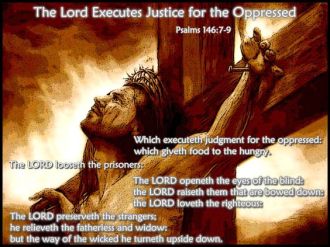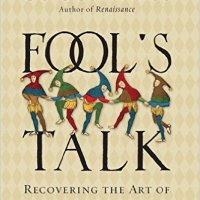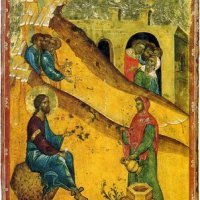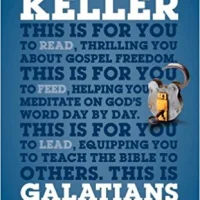 We’re in the middle of a three-week Advent series on how to prepare our hearts for Christmas. Last week we looked at what it means to wait for the Lord, and we learned that one of the main things we wait for as Christians is Christ’s coming. The Bible calls it Our Blessed Hope. Which brings us to our topic this week: Hope. Now hope is a very misunderstood concept in our culture. The way we talk about hope is that it’s only useful when you’re in a life-threatening situation, and you must switch off your better judgment that would otherwise drive you to despair. In other words, we treat hope like a survival technique, a trick we play on our minds as we suspend rational belief in order to hold on just a little bit longer. Because maybe, just maybe, such hope will get you through. But Christian hope is not about ignoring what you know. Instead hope is about finding the power to keep going without giving up what you know—that God will get you through. That kind of hope is much more difficult to get, but it’s worth the search to find it.
We’re in the middle of a three-week Advent series on how to prepare our hearts for Christmas. Last week we looked at what it means to wait for the Lord, and we learned that one of the main things we wait for as Christians is Christ’s coming. The Bible calls it Our Blessed Hope. Which brings us to our topic this week: Hope. Now hope is a very misunderstood concept in our culture. The way we talk about hope is that it’s only useful when you’re in a life-threatening situation, and you must switch off your better judgment that would otherwise drive you to despair. In other words, we treat hope like a survival technique, a trick we play on our minds as we suspend rational belief in order to hold on just a little bit longer. Because maybe, just maybe, such hope will get you through. But Christian hope is not about ignoring what you know. Instead hope is about finding the power to keep going without giving up what you know—that God will get you through. That kind of hope is much more difficult to get, but it’s worth the search to find it.
Why do you and I have a hard time with real hope? Probably because it’s hard to put your trust and hope in God alone when so often he chooses to give help invisibly and providentially through the efforts of honorable people, even those who are powerful and influential. It’s also hard to hope because his timing and provision are usually way different from our expectations. Without a clear-eyed vision of both God’s character and strength, and human character and limitations, we are prone to a hopeless form of deism (in other words, believing God’s policy for helping is hands-off), or maybe even a reactive anger aimed at God, rather than Christian hope.
This is where Psalm 146 can help you. It teaches us to praise the Lord who reigns forever, and to put your trust and hope in him, because God always lives to deliver his covenant children who are in need.
The Reliability of Christian Hope
A hope worth living for (vv. 1-2)
People put their hope in lots of things. What they’re really doing is grasping for meaning in life—something worth living for. Love, Family, Career, Money, Fame. The problem with all such things, if they are your ultimate hope, is they will turn out to be ultimately meaningless. They will prove in the end (or maybe before then) to disappoint, to dissatisfy, and to dissolve. They aren’t big enough to sustain the weight of ultimate meaning that so many invest in them. Now, all that is not explicit in Psalm 146, but it’s there. No one can arrive at the mature understanding that praising God is the only hope worth living for unless he has seriously weighed glorifying God against all other supposed hopes. You can either gain this conviction by wisdom acquired from others or from the school of personal experience. Here the psalmist exhorts you to put your hope in the Lord—to make praising him your meaning and purpose in life. How does he do this? By first calling us all together to worship, and secondly by calling himself to worship. By corporate and individual exhortation to praise the Lord. Why is this important? Because both the attitude and activity of worship are spiritually formative. It’s obvious why a worshipful attitude is necessary to praise God. Otherwise our hearts are far from him—in no condition to praise. But what about the activity of corporate worship? It shapes us because human beings are meant to be connected to each other in loving community, all living for the same meaning and purpose. Corporate worship is a weekly expression of our shared story, meaning, purpose, and hope. When we worship God together we declare he is worth living for because all our hopes are invested in him alone. To put this succinctly the psalmist knows that liturgy (the ritual, repetitive, and rehearsing act of worship) is spiritually formative—it’s good for the soul because God uses it to convince us that he is praiseworthy and therefore worth living for.
A hope with staying power (vv. 3-4)
If this is true, then why would anyone put their hope and trust in anything else? Of course you know the answer. Because when you’re short one egg for breakfast, you knock on your neighbor’s door. When you’re sick, you call the doctor. When you’re threatened, you call the police. When you’re feeling helpless in a situation, you call someone for help. Even when you’re in need, if you pray first (which you definitely should), getting help from powerful, influential, honorable people can have a particular negative effect on you. If you’re not careful, your trust in God can slowly erode. After all, isn’t it obvious who’s giving you the help? People. And so you’re tempted to trust in people first and maybe God second because that way of looking at life seems more practical. But it’s not, and the psalmist knows that. It’s a little morbid, but his point is that people, even the most helpful ones, ultimately have no staying power. The day will come when every single helpful person will exhale one last time, and with that all their good plans to help will die. When the body returns to dust, its power to help turns to dust as well. From this perspective, doesn’t it look foolish to put your hope and trust in the princes of this world? There is no salvation in a son of Adam. Which begs the question: “From where does my help come from? My help comes from the LORD, maker of heaven and earth” (Ps 121:1-2).
To not trust in powerful or honorable people doesn’t mean they cannot offer real and tangible help. Sometimes a person promises help and then delivers. A biblical example of this is a story about how King Saul won a great military victory for the Israelites (1 Sam 11:9-13). When the people gave him all the credit, even Saul, who turned out to be a pretty rotten ruler, was careful to give thanks to God. To use a more common illustration, consider how God providentially delivers food to your plate by first giving rain and sunshine, and second through the labors of farmers, producers, distributors, sellers, and sometimes through the generosity of those who buy enough to share. So what is the principle that makes sense of all this? Here’s the key: to trust in the LORD and not in humans is to depend on God as the divine help behind the human help. God’s help is the source and sustenance of human help. Human help is the visible manifestation of his invisible help. So when you receive help from someone, give thanks to the person, but primarily give thanks to God as the Helper behind your helper. Without God’s hand upholding all human help, it will all fall apart.
The Promises of Christian Hope
The Creator God will faithfully keep watch over us (vv. 5-6)
God the Creator is powerful. He made absolutely everything in the universe. Think about the promise we have in this psalm. The one who hopes in the LORD God is blessed. Not will be blessed. Blessed now. Happy now. Full of hope and trust right now whatever your life circumstances. How can that be? Because the object of your trust is in the all-powerful Creator. The one who made heaven, the earth, the sea, and every created thing in them. If you think you’ve got a grasp on that then you’ve forgotten how big the universe is!
John Glenn, the first American to orbit the earth and the fifth astronaut in space, died at 95 years old last week. Just by ascending a few hundred miles, he recognized that God’s creative power was way too awesome to comprehend. Earth is a tiny speck in our solar system, which is a tinier speck in our galaxy, which is an even tinier speck in the universe teeming with other galaxies. Yet after orbiting our teeny little planet Earth, Glenn was bursting with confidence in the Creator. Here’s what he said: “I pray every day and I think everybody should. I don’t think you can be up here and look out the window as I did the first day and look out at the Earth from this vantage point. We’re not so high compared to people who went to the moon and back. But to look out at this kind of creation out here and not believe in God is, to me, impossible. It just strengthens my faith.”
God the Creator is trustworthy. Do you see how observing the incalculable power of the Creator should bolster your trust in him? Even though God has so many other things in the universe he could attend to, he promises to keep a constant watch over you and me. That’s what verses 5-6 are saying. Remember the story of Jacob, how he cheated his brother Esau out of the firstborn birthright and blessing, and then had to flee the country to escape Esau’s wrath? On his way out of town God appeared to Jacob in a dream and said to him, “Behold, I am with you and will keep you wherever you go, and will bring you back to this land. For I will not leave you until I have done what I have promised you” (Gen 28:15). The rest of Genesis is the story of how God acted to keep that promise—to Jacob and his descendants forever. God kept his promise to faithfully keep watch over Jacob the man and Israel his people. His watching is not merely a distant gaze, but a vigilant watch so he can spring to action when you need to be saved.
The LORD God will act to save us (vv. 7-9)
He is the compassionate champion of justice for the helpless. God is compassionate, just, and merciful toward the weak and defenseless. His pity is all-embracing. He is our champion. He is so good that he guarantees justice for the oppressed, the hungry, prisoners, the blind, those weighed down low, the righteous sufferer, the alien immigrant and refugee, widows, orphans and the fatherless. This is a typical catalog of salvation in OT language. Although there is nothing new to be learned about God here, the psalmist brings it all together so we’ll be overwhelmingly convinced that God is so good. The point is to praise the LORD.
Notice Jesus did not separate social and spiritual needs as he intervened to help. He attends to both. So should we because that is the heart of God, and we are so often God’s instruments (his hands and feet) here on Earth. An important aspect of being faithful to God’s will is a special concern for the poor and downtrodden. Every branch of the church in every age has acknowledged the church’s duty, even every Christian’s duty, to discharge the ministry of mercy. When you understand the gospel of grace it changes you in at least two ways. First, if you believe you have received undeserved mercy from God, your heart will grow large enough to extend mercy to the most difficult and ungrateful people because of the way Christ reached out to help you. You didn’t deserve God’s mercy. No one does. But the love of God moves you to be merciful toward people you’re not normally drawn to. Second, if you are moved by God’s compassion toward you in your dire need of him, your heart will be moved to spontaneously give out of compassion. At this point I can imagine someone might object that because mercy is undeserved it is technically optional. But to say mercy is not a requirement but merely a suggestion for Christians is to fundamentally misunderstand the heart of God. That excuse just exposes our ignorance of God’s will as revealed in both the OT and NT. Mercy is actually commanded as a debt we owe to those who need help. But keep in mind that mercy should never be only in response to the command. For your help to be real mercy and compassion, it must overflow in generosity as a response of praise to God for his mercy to you. Generosity is the hallmark of being a true Christian when it is a sacrifice of praise to God’s grace. Tim Keller puts it starkly, “[Biblical] justice is the index of real faith, the index of a real relationship with God—of the real spiritual condition of your heart.”
He is also the unbeatable enforcer of justice on the wicked. I like the way Bible teacher Alec Motyer summarily phrased these verses: “Orphan and widow he supports, and the way of the wicked he contorts.” The LORD frustrates the way (the general course of life) of the wicked—the ones who oppress, take advantage, not adequately help, or even ignore the needy. Whereas the LORD’s kindness is active toward the foreigner, the fatherless, and the widow, his will is also active to thwart the ways of the wicked, the proud, the powerful, and the abusive. God is not just angry with the wicked. He works against them and destroys their schemes. He fights against them as he fights for the needy. He destroys all their counsels, acts, attempts, and enterprises so that none will succeed. God’s way upends the wicked power structures of society. His kingdom seems upside-down compared to the world’s kingdoms, but God’s way is really right-side up, restoring proper order and harmony to the world.
The LORD thwarts the ways of the wicked like a chess master checks every move of his opponent. When the wicked make plans to harm or ignore the defenseless, every move they make is in the direction of God checkmating them. God cannot be beat at the game of oppress chess.
The Fulfillment of Christian Hope
The LORD will reign forever (v. 10a)
By now you may be wondering what does all this have to do with Advent and Christmas? Do you see that Psalm 146 has been moving in that direction all along? In verse 10 it becomes clear. The fulfillment of Christian hope began when Christ was born! Most commentators believe this psalm was written after the Babylonian Exile. At that time God’s visible kingdom was obscured because there was neither king nor throne in Jerusalem. And so the people looked to the future hoping that one day God would keep his promise of a forever king. They suffered with tears and anguish at the hands of various human princes who either oppressed them or left their hopes unfulfilled. God’s people lived every day hoping for the Messianic King to finally usher in the kingdom of righteousness. And then one day, our God who lives to faithfully keep watchful eye on us from heaven came down. He showed how much he loves us by sending his one and only Son to us. God proved his love for the poor and needy when he became a helpless baby born to poor parents. Throughout his earthly ministry Jesus reflected the heart of God when he showed compassion for the poor and afflicted (Lk 4:18-21; 7:21-23; cf. Dt 10:18-19; Isa 61:1). We call it Christ’s “humiliation,” which the Shorter Catechism (27) says “consisted in his being born, and that in a low condition, made under the law, undergoing the miseries of this life, the wrath of God, and the cursed death of the cross; in being buried, and continuing under the power of death for a time.”
The LORD will dwell with all of us forever (v. 10b)
And here’s the best part. Do you realize the incarnation of Christ means that God is Emmanuel forever? The Bible says when Jesus was born God came to dwell with all of us (Jn 1:14). Never before could we put our hope in a son of Adam because they all eventually perished, never to return. But when the Son of God took on human flesh, he became the Son of Man, the Son of Adam, who can and does bear the weight of all your hopes. Crucified for the forgiveness of sins, and risen to live forevermore, he is now and always present to save. Unlike in princes or any other son of Adam, in him there is salvation—from your sins, from your enemies, and from the travails of this broken messed-up world. Therefore you can trust and hope in him completely. So who is Zion in this last verse? Zion is a poetic name for Jerusalem the capital city of the LORD’s earthly reign (Pss 50:2; 74:2; 84:7; 128:5; 129:5; 137:6). Atop Mount Zion sits the City of God, the LORD’s home where he dwells with his people from generation to generation (Exo 15:17; Pss 29:10; 132:13-15). But Zion the City of God is also a poetic description of God’s people, the New Jerusalem—the beloved Bride of Christ (Rev 20:2-4). Listen to how hopeful verse 10 sounds when you hear it as God’s people waiting in hope for her king to come. “The LORD will reign forever, your God, O beloved one, to all generations.”
As you prepare your heart this season for celebrating the birth of Jesus Christ, do not forget that the Christian’s hope is not yet completely fulfilled. In one vein, we rejoice that Christ has come, when he initiated at his birth the final fulfillment of all God’s promises. But in another vein, we look forward in hope to the consummation of all God’s promises, on that day when your hopes will be completely realized, and you will dwell in the presence of the LORD your God forever. Christian hope is not unrealistic optimism, but the assurance that suffering is not meaningless. There is ultimate meaning and hope for all whose difficulties and trials are infused with faith in our trustworthy Lord. Since this is true, God’s faithful people should praise him thus right now, in the land of the living and suffering, in anticipation and hope of everlasting praise in heaven. That’s the note this psalm ends on: Hallelujah! Praise the LORD!
Resources
Sermon audio download
Sermon outline & commentary













